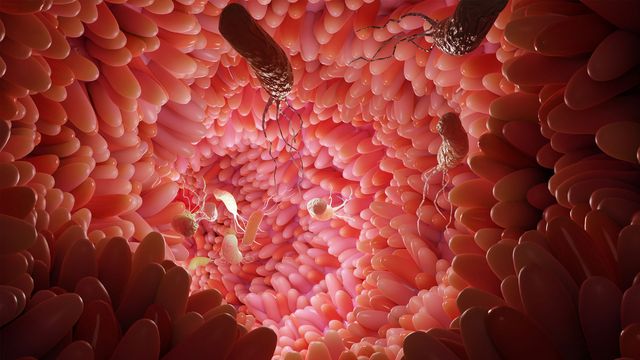The researchers were originally studying genetic influences of insulin resistance in mice when they noticed that certain mice were less prone to the condition had genes that changed the production of defensin peptides in cells lining the intestine.
“Defensin peptides are present in a wide range of organisms, from plants to mice and humans, and are thought to be the earliest precursor to an immune system,” Dr Masson said. “Mice and humans seem to have evolved many defensin genes, each making a different peptide. It is thought that this diversity allows our immune system to fend off a wide range of attackers”.
The researchers found that mice whose genes made more alpha-defensins were healthier than mice who made less.
To test these findings, the researchers then synthesised the defensin peptides in the lab and fed them to mice without the genes. The experiments showed this protected mice from the negative effects of an unhealthy diet.
“These initial findings are exciting because they show we can potentially use peptides to address chronic diseases from diabetes to obesity to depression – all of which have been linked to the health of our microbiome over decades of research,” Dr Masson said.
Critically, while certain genetic strains of mice gained benefit from the defensin peptides, others did not and were, in fact, worse off.
“This shows the importance of ‘personalised medicine’, or tailoring treatments to complement the genes of individuals rather than taking a one-size-fits-all approach to medications,” Dr Masson said. “We need to establish how different individuals and microbiomes react to the same treatments, whether they be defensin peptides or common medications already in use.”
How beneficial bacteria can boost wellbeing
Dr Masson said the team is now looking to expand on the research and explore how it applies to human health.
“We’re looking to measure these peptides in humans. In particular, measuring them in the gut and looking at the relationship with metabolic health and the microbiome.
“I’m also interested in defensins beyond diabetes. We know the microbiome is involved in many chronic diseases like cancer; I suspect defensins could play a role in this field.”
Professor James said that this illustrates the potential power of precision medicine.
“Our work clearly shows how manipulating the gut microbiome with these peptides benefits some but not others,” he said. “This highlights both the potential of precision medicine and the potential dangers of trying to alter our gut microbiome, such as with supplements or even fad diets, before we know more about how our bodies maintain healthy microbiomes unique to each of us.
“We are at the foothills of precision medicine, and the picture looks promising, but we have a long way to go.”
Reference: Masson SWC, Simpson RC, Cutler HB, et al. Genetic variance in the murine defensin locus modulates glucose homeostasis. The EMBO Journal. 2025. doi: 10.1038/s44318-025-00555-5
This article has been republished from the following materials. Note: material may have been edited for length and content. For further information, please contact the cited source. Our press release publishing policy can be accessed here.

